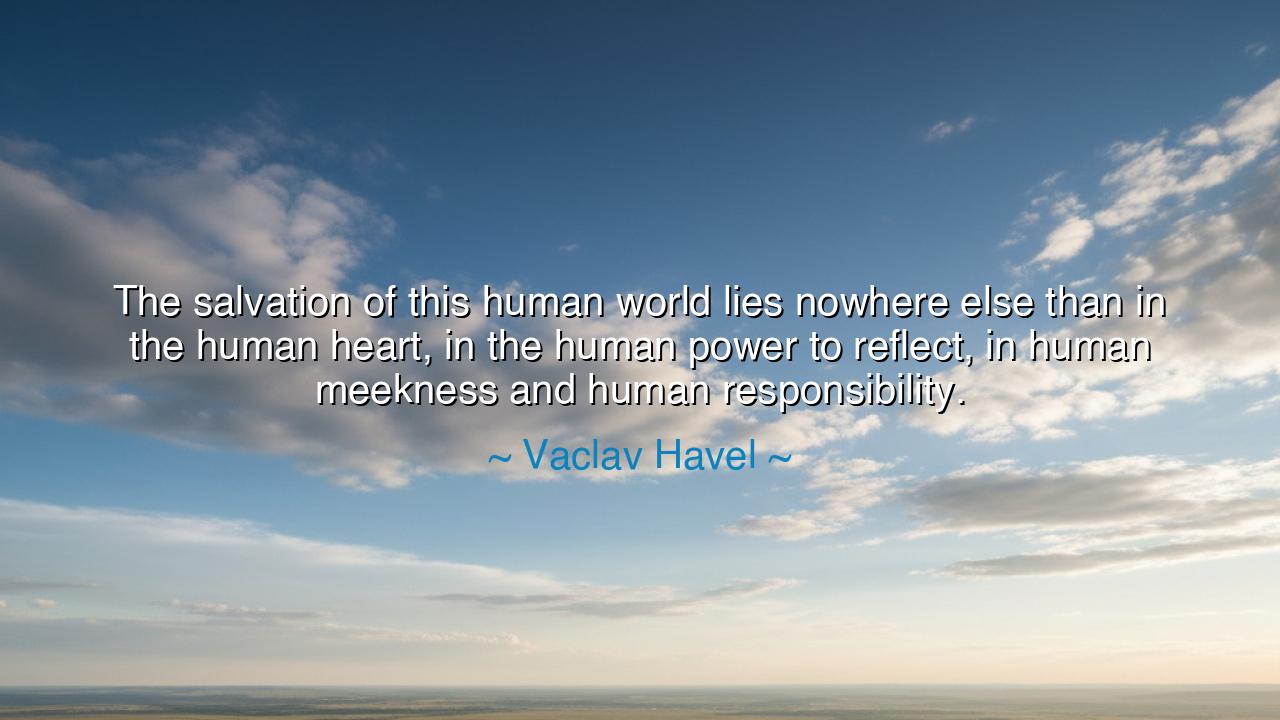
The salvation of this human world lies nowhere else than in the
The salvation of this human world lies nowhere else than in the human heart, in the human power to reflect, in human meekness and human responsibility.






In the words of Václav Havel—“The salvation of this human world lies nowhere else than in the human heart, in the human power to reflect, in human meekness and human responsibility.”—there resounds a truth forged in suffering and in hope. He teaches that the destiny of the world is not secured by armies or machines, nor by riches or decrees, but by the heart of man. Within the chambers of conscience lies the key to salvation, for only there can mercy, justice, and compassion be born.
The ancients themselves declared the same. Confucius taught that good governance begins not with law, but with self-cultivation, for a man who cannot govern his own heart cannot govern a kingdom. Likewise, Havel insists that external power is hollow if it is not anchored in reflection and humility. To look inward, to weigh our actions, and to act with responsibility—this is the soil from which a just world may grow.
His words are born of experience. Living under the weight of oppression in communist Czechoslovakia, Havel saw how power divorced from meekness and responsibility corrodes both rulers and the ruled. He understood that true change does not descend from above, but rises from within, from ordinary people who dare to listen to conscience, even at great cost. Thus his teaching carries both the weight of history and the flame of lived truth.
History offers us kindred examples. When Mahatma Gandhi faced the might of the British Empire, he did not turn to violence but to the human heart, summoning meekness and responsibility through nonviolent resistance. His reflection became a nation’s strength, and his meekness became a weapon greater than the sword. Gandhi, like Havel, proved that true power is not domination, but the courage to act justly, even when the world mocks such a path.
Thus, let this wisdom endure: the world is not saved by towers of stone or weapons of steel, but by the human heart that chooses reflection over arrogance, humility over pride, and responsibility over selfishness. These are the pillars that hold civilization aloft. Havel reminds us that each man and woman is a guardian of the world, and only when we rise to that sacred duty will the earth itself be healed.






VTLong Van Thanh
Vaclav Havel’s quote offers a thought-provoking perspective on what truly drives positive change in the world. It highlights the importance of personal responsibility and humility in shaping a collective future. But in a world full of distractions, how often do we actively reflect on these qualities? How can we cultivate more of these virtues in our everyday lives and inspire others to do the same for a meaningful impact?
TMThanh My
Havel’s words remind us that the foundation of a better world might be simpler than we think—rooted in our capacity for empathy, reflection, and responsibility. But with all the global crises we face today, can these qualities truly make a difference in the face of so much conflict and suffering? What would it take for humanity to shift its focus from external power to these inner qualities that Havel speaks of?
HTMinh Hieu Tran
This quote by Havel suggests that our true salvation lies within us, in our ability to reflect and act with responsibility. But how realistic is it to expect that the collective actions of individuals can transform the world? In a society driven by greed, power, and self-interest, can personal reflection really lead to significant change? What kind of shifts in mindset and values would be necessary to make this idea a reality?
DLDuc Luong
Vaclav Havel’s quote speaks to the core of human nature—our ability to reflect, take responsibility, and show humility. But in a world where so much emphasis is placed on power and external achievements, how often do we truly prioritize the internal virtues he mentions? Are we really paying enough attention to our hearts and minds to shape a better world? Can humanity find salvation through introspection and compassion alone?